Silverchair
All you need to know about the band
Compiled By Mishal Ali Khan
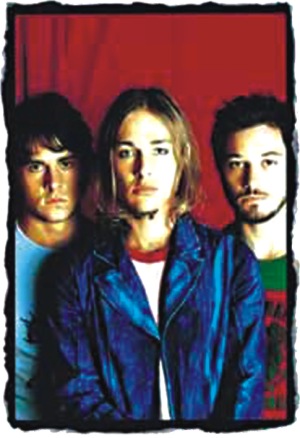 SIlverchair
is Australia's most successful contemporary rock band and now a well-known
band around the world. The group has sold over six million albums
worldwide. Hitting the big scene at only the age of fifteen, these
Aussie rockers seemed to be an offspring of Nirvana and Pearl Jam,
with strong derivatives from the grunge-ish styles.
SIlverchair
is Australia's most successful contemporary rock band and now a well-known
band around the world. The group has sold over six million albums
worldwide. Hitting the big scene at only the age of fifteen, these
Aussie rockers seemed to be an offspring of Nirvana and Pearl Jam,
with strong derivatives from the grunge-ish styles.
The members of Silverchair were all
born in 1979 in the Newcastle surf suburb of Merewether. Singer/guitarist
Daniel Johns and drummer Ben Gillies started making music together
at primary school and schoolmate Chris Joannou later joined on bass.
In the group's early days they were called Innocent Criminals and
their repertoire consisted mainly of Led Zeppelin, Deep Purple and
Black Sabbath songs they had learned from their Dads' old record collections.
The trio played many shows around
the Hunter Valley region in their early teens. They got their big
break in mid-1994 when they won a national demo competition called
"Pick Me" which was conducted by SBS TV show "Nomad"
and youth radio station Triple J. The group's entry was a song called
"Tomorrow" which quickly landed them a recording contract.
The band changed its name to Silverchair
and in August 1994 they released "Tomorrow". The song eventually
spent six weeks at #1 on the Australian singles charts and in 1995
it became the most played song of the year on U.S. modern rock radio.
Silverchair's debut album "Frogstomp",
recorded in just nine days in early 1995, was a raw sounding slab
of edgy alternative rock. A #1 hit in Australia and New Zealand the
disc went on to become the first Australian album since INXS to hit
the U.S. top 10, selling more than 2.5 million copies throughout the
world. As "Frogstomp" and "Tomorrow" propelled
Silverchair to music superstardom through 1996 the group juggled memorable
performances on the roof of Radio City Music Hall and tours with Red
Hot Chili Peppers alongside full time schooling commitments back home
in Newcastle.
The trio also found time that year
to record their sophomore album "Freak Show" which was released
early in 1997. A more adventurous piece of work than "Frogstomp"
this disc yielded three top ten singles in Australia - "Freak",
"Abuse Me" and "Cemetery". "Freak Show"
went gold in the United States and global sales eventually exceeded
1.5 million copies in spite of the fact that the band had to juggle
world tours while trying to finish their final year of high school.
After finally graduating from school
the band were able to spend much more time creating their critically
lauded breakthrough, "Neon Ballroom" which was released
in March 1999. The group's songwriter, Daniel Johns had been battling
personal demons as he attempted to adjust to Silverchair's sudden
success and he poured these experiences into his new batch of songs.
Determined to shake the constant musical comparisons which had previously
dogged his band Johns created a truly original sounding album. Fusing
heavy rock with orchestral flourishes and synthetic touches with powerfully
emotional lyrics, "Neon Ballroom" was universally acclaimed
as a huge creative leap for Johns and his band mates.
Silverchair toured extensively in
support of the album propelling it to even stronger worldwide sales
than they had achieved with "Freak Show". In Europe and
South America it became the group's most successful album to date
due to the Comet Award winning "Ana's Song" - a track about
Daniel Johns' battles with an eating disorder. Elsewhere, distinctive
tracks like "Emotion Sickness" and the aching "Miss
You Love" established once and for all that this young group
is not just a fad; they are genuinely talented musicians who are here
to stay.
The band toured Europe and the U.S.
throughout 1999 including appearances on leading festivals such as
Reading and Bizarrefest and tours with bands like Red Hot Chilli Peppers
and Blink 182. After all this touring the band announced that they
would be taking a 12-month break to recharge their batteries.
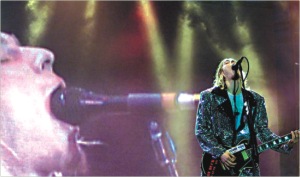 Silverchair's
one and only gig in 2000 was a sold out appearance at Australia's
Falls Festival on New Years Eve. It was followed on January 21, 2001
by the biggest show of their lives - 250,000 people at Rock In Rio
- a performance which the band describe as the highlight of their
career to date.
Silverchair's
one and only gig in 2000 was a sold out appearance at Australia's
Falls Festival on New Years Eve. It was followed on January 21, 2001
by the biggest show of their lives - 250,000 people at Rock In Rio
- a performance which the band describe as the highlight of their
career to date.
In June 2001 the band entered a studio
in Sydney with producer David Bottrill (Tool, Peter Gabriel, King
Crimson) to start work on their fourth album, "Diorama".
This time Daniel Johns formally assumed the role of co-Producer and
set out to explore even more new musical territory.
A range of other musicians were drawn
in to contribute to the disc, most notably the legendary Beach Boys
and U2 collaborator, Van Dyke Parks who contributed orchestral arrangements
to three tracks including a lush epic called "Luv Your Life".
Also helping out again were "Neon Ballroom" sidemen, Paul
Mac and Jim Moginie.
Silverchair fans got their first taste
of "Diorama" when a single called "The Greatest View"
was released in Australia in January 2002. The track displayed a fresh
new sound showing yet another creative leap for the band now rock
veterans at the age of 22.
Diorama means "a world within
a world". It's a particularly apt name for Silverchair's new
CD as this evocative piece of work lifts you out of the everyday and
carries you into a world of its own. "Our other albums have all
been pretty black", explains Daniel Johns when asked to summarize
the new album. "This time around I wanted to try painting with
lots of colours".
"No matter what people have got
going on in their lives, hopefully when they play this album it will
make them forget about everyday stuff. When music does that it's magical
and, for me, that's what "Diorama" is about", says
Silverchair's Daniel Johns.
The album sees the Newcastle trio
embracing melody and combining it with lyrics that are brighter than
most of their previous works. It's a huge creative leap which also
sees them exploring a vast array of instrumentation and musical styles.
The resulting piece of work literally
covers the whole musical spectrum as its colourful cover suggest.
It moves from edgy rockers "The Lever" and "One Way
Mule" to sweeter tunes such as "After All These Years"
and "World Upon Your Shoulders". There are also irresistible
melodic rock songs like "Without You" and the fantasia-esque
epics "Across The Night" and "Tuna In The Brine".
It's a technicolour collage that's innovative and memorable.
The album's international performance
has unfortunately been severely affected by the band's inability to
tour or do promotional appearances due to Daniel Johns' ill health.
The singer/guitarist has spent 2002 battling a severely debilitating
case of reactive arthritis from which he is now recovering. This all
began to change in October 2002 when the band's work on "Diorama"
won them six ARIA Awards including "Best Group" and "Best
Rock Album". In a last minute surprise the trio returned to the
stage to deliver a searing performance of "The Greatest View"
which catapulted their album back into the national top 20. The ARIA
triumph capped a roller coaster year for the band a year which in
many ways traced the journey of "Diorama" itself from bleak
times into a much happier new dawn.
Zedane
says AuRevoir
By
shuvom_isilhir
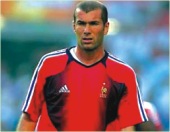 THis
is probably the biggest news to hit the footballing world recently.
Zinedine Zidane has announced his international retirement. This means
that "Zizou" has at last ended his long relationship with
"Les Bleus" and would no longer be seen in French colours.
THis
is probably the biggest news to hit the footballing world recently.
Zinedine Zidane has announced his international retirement. This means
that "Zizou" has at last ended his long relationship with
"Les Bleus" and would no longer be seen in French colours.
So what does it
mean to our miserable lives filled with such social problems as a
slow net connection? Nothing! But I think it's more sensible to be
paying a tribute the greatest footballer of this age than to be a
mad fan of some latest singing idol and to be jumping up and down
around them, screaming, weeping. And many of you are fans of Beckham's.
He too is a footballer, did you know? So don't go asking people about
why you haven't seen any of his movies. It makes you 'look' stupid.
Now, the question
is, why would France's best performer in the recent Euro 2004 finals
decide to retire? As usual the media has come up with some chaos-in-the-team-type
of news, and it looks catchy. The three Arsenal-men, and Zidane's
national teammates, Thierry Henry, Patrick Vieirra and Robert Pires
are said to have had a hand in it. You see, Zidane was sure to be
France's captain after the retired Dessailly, and Vieirra wanted the
same spot, just as he has it with Arsenal. On the other hand, Henry
wanted to be the next Zizou and take his place (and be called Hen?).
Now that would leave Pires with more left-hand ground to operate on.
It all fits, doesn't it? But as a Gunner myself, I'd like to think
of it all as a load of tabloid rubbish. The man himself says that
it was time for him to say 'stop', that he intended to make room for
others and that it was well thought-of; so what's the fuss?
So, why's the
man so 'great'? Well, it'd normally be crazy to think that such skills
could be found in a man of his size. But I haven't seen a better controller
of the ball in my time. He can do the trickiest tricks and dribbles
and make it look simple. And few possess his vision and passing ability.
And to sum up all, he's got a good footballing brain. So the 32-year-old
is mostly celebrated for his football-skills rather than for his looks
or some audacious haircut (he's got a bald patch) and nor did he burst
into the scene with some 50-yards stunner like Beckham.
Zinedine Yazid
Zidane was born in 23rd June 1972, in Marseille suburbs, off immigrant
Algerian parents. At a young age he joined US Saint-Henri club. Later
he moved to SO Septemes. Even at eight years of age he showed skillfulness
with the ball. It is said that other kids didn't often challenge him
because he'd simply shrug them off with his strength and stature.
At 14 he, was noticed by Cannes and in 1987 he joined the French First
Division team. He made his debut for the club at 1989 and started
operating as the heart of the attack behind two the two forwards.
He got his first goal in '91 but the '91-'92 season didn't go well
for him. In 1992 he got transferred to Bordeaux, though sought by
Marseille. In 1994, voted as the Best Young Player in France, he made
his international debut as a second-half substitute against the Czech
Rep. and scored two goals within 17 minutes to take France from 2-0
down to a 2-all draw. In '96 Bordeaux reached the final of the UEFA
Cup but failed to win it. This was his last year with the club. Alex
Ferguson of Manchester United is said to have been interested in Zidane
but the Turin giant Juventus bought Zidane from Girondins Bordeaux
by only 3.2 million pounds in '96. His first season with Juve was
mediocre but he had won the 1996 European Super Cup and the Intercontinental
Cup. The next two seasons, in 1997 and '98 Juventus was crowned the
Italian Champions and made it to the Champions League final. They
also won the League Super Cup in '97. In the Euro '96 France qualified
for the semi-finals. But '98 was to be the year for Zidane. There
he met his biggest ups and downs.
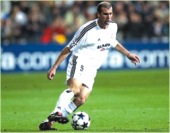 France
hosted the World Cup '98 finals. It was probably in the first of the
knockout phases that Zidane's tempers flared up and he (I think) stomped
on some Saudi Arabian player and got a red card. He was suspended
for two matches. The media was all over him and he became a villain
to the French people. France made it to the final without him. But
in the final match Zidane came back and it was like some Return-of-the-King
story. As a Brazil fan, I remember a lot of what happened. Zidane
scored the first goal on the 27th minute and the second after the
45th. I remember one going right through Carlos' legs. Both were scored
by the head and that's considered one of his weaker sides (try telling
that to Raul)! His fellow midfielder Petit scored France's third and
last one to beat Brazil 3-0. France won the '98 World Cup and much
credit went to Zidane. It's since then that he started winning FIFA's
World Player of the Year award. He won it three times (in 1998,2000,2003).
A feat matched only by the great Ronaldo. He was also voted the European
Player of the Year in '98. He also helped France win the Euro 2000
and became the player of the tournament.
France
hosted the World Cup '98 finals. It was probably in the first of the
knockout phases that Zidane's tempers flared up and he (I think) stomped
on some Saudi Arabian player and got a red card. He was suspended
for two matches. The media was all over him and he became a villain
to the French people. France made it to the final without him. But
in the final match Zidane came back and it was like some Return-of-the-King
story. As a Brazil fan, I remember a lot of what happened. Zidane
scored the first goal on the 27th minute and the second after the
45th. I remember one going right through Carlos' legs. Both were scored
by the head and that's considered one of his weaker sides (try telling
that to Raul)! His fellow midfielder Petit scored France's third and
last one to beat Brazil 3-0. France won the '98 World Cup and much
credit went to Zidane. It's since then that he started winning FIFA's
World Player of the Year award. He won it three times (in 1998,2000,2003).
A feat matched only by the great Ronaldo. He was also voted the European
Player of the Year in '98. He also helped France win the Euro 2000
and became the player of the tournament.
In
2001 Spanish club Real Madrid paid Juventus a record $66 million to
secure his services. He didn't take much time to shine in La Liga.
In 2002 his fantastic volleyed goal won Real the Champions League.
The same year they won the Intercontinental Cup and the European Super
cup and he became the UEFA player of the year. In 2003 Real became
the Spanish Champions and won the Spanish Super Cup.
At the recent
Euro 2004 he scored 3 goals including that injury-time thriller vs.
England.
But France were
knocked out of the quarterfinals by the Greeks. That proved to be
Zidane's last international match.
He's
not the first World Cup winner to retire. Dessailly, Blanc, Thuram,
Lizarazu and Deschamps have all retired before him. Maybe after 93
int'l caps and 26 goals under his belt, it's ok to say good-bye. But
players like Larsson came back. Who knows if he will in Germany for
the 2006 World Cup?
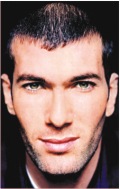 Zizou
at a glance:
Zizou
at a glance:
Name: Zinedine Yazid Zidane
Nicknames: Zizou, Yaz etc.
Birth-date: 23rd June 1972
Birthplace: Marseille
Parent's Name: Smail and Malik Zidane
Height: 185cm - 6ft 1in
Weight: 80kg
Position: Midfielder (attacking)
Clubs: Cannes (France, 1987 - 1992)
Girondins Bordeaux (France, 1992- 1996)
Juventus (Italy, 1996- 2001)
Real Madrid (Spain, 2001-on)
Awards and achievements:
1996: European Super Cup and the World Club Cup with Juventus.
1998: World Cup with France.
1998: European Player of the Year award.
1999: FIFA 1998 World Player of the Year.
2000: Euro 2000 with France, Player of the Tournament.
2000: FIFA World Player of the Year.
2002: European Champions League with Real Madrid.
2002: World Club (Intercontinental) Cup with Real Madrid.
2003: FIFA World Player of the Year
(beating Henry and Ronaldo).
The Bourne
Supremacy
Jason
Bourne: Matt Damon
Marie Helena: Franka Potente
Agent Landy: Joan Allen
John Nevins: Tim Griffin
Zorn: Gabriel Mann
Nicolette: Julia Stiles
Ward Abbott: Brian Cox
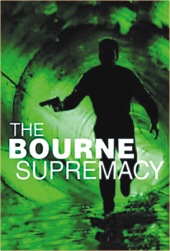 AS
we know from the first movie, Bourne is awakened from amnesia with
skills he did not even know he had. He finds a cache of passports,
guns and other aids to survival all of which is left to him by himself.
In this sequel Jason Bourne (Matt Damon) is still a killer who's trying
to run from his bloody past. People want him dead and he has no idea
why because he is still trying to jog his memory.
AS
we know from the first movie, Bourne is awakened from amnesia with
skills he did not even know he had. He finds a cache of passports,
guns and other aids to survival all of which is left to him by himself.
In this sequel Jason Bourne (Matt Damon) is still a killer who's trying
to run from his bloody past. People want him dead and he has no idea
why because he is still trying to jog his memory.
The Plot: The past weighs most heavily on Jason Bourne
and he wants to atone for sins he can't even remember. He knows that
was part of black-ops wing of the CIA called the Treadstone Project.
Rcurrent dream send him jogging down the beach in Goa, India where
he's hiding out with girlfriend Marie (Franka Potente) in the opening
scenes. There he spends a brief period of happiness until Bourne spots
a stranger who is wearing the wrong clothes, driving the wrong car
and turning up in all the wrong places. Soon he is marching straight
ahead into the enemy network using himself as bait.
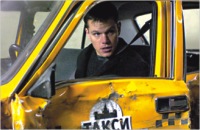 Someone
is assassinating agents and leaving Bourne's fingerprints as evidence.
. They've found Bourne's fingerprints at the scene of a murder in
Berlin involving a CIA agent and his high-level criminal contact.
A highly placed CIA agent named Pamela Landy (Joan Allen) is convinced
that Bourne is a rogue killing machine. But Bourne was in Goa at the
time, so who's framing him?
Someone
is assassinating agents and leaving Bourne's fingerprints as evidence.
. They've found Bourne's fingerprints at the scene of a murder in
Berlin involving a CIA agent and his high-level criminal contact.
A highly placed CIA agent named Pamela Landy (Joan Allen) is convinced
that Bourne is a rogue killing machine. But Bourne was in Goa at the
time, so who's framing him?
This
makes for a great thriller but the movie is less about finding out
who has framed him and more about whether he will survive by the end
of the movie. He survives one lethal trap or ambush after another,
leaps off bridges, kills assailants and crashing cars in demolition-derby
car chase through rush-hour Moscow. It's where Bourne finally lets
his emotions get the better of him rendering a heartfelt apology for
the destruction he has caused. Of course, unlike other hero movie
he does come out looking a little worse for wear.
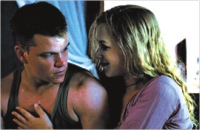 Throughout
the movie he is fighting his way through wearing the same black shirt,
pants and jacket trekking all over India to Italy to Germany to Russia.
The movie hurtles from one location to the other without ginving the
viewers a chance to catch their breath.
Throughout
the movie he is fighting his way through wearing the same black shirt,
pants and jacket trekking all over India to Italy to Germany to Russia.
The movie hurtles from one location to the other without ginving the
viewers a chance to catch their breath.
The movie is supported by a stellar cast all working
at cross purposes. There is a slimy Russian oil entrepeneur (Karel
Roden) and his personal assassin (Karl Urban) sporting a radical hairdo.
Brian Cox as a CIA hatchet man and Julia Stiles still plays a low-level
agent.
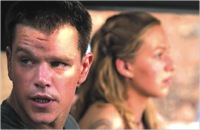 The
Bourne Supremacy" is another brainy, fast spy thriller. Damon
plays the hero without any flash which works perfectly for him. The
movie skillfully delivers a series of plots, chases and stylized fight
scenes. There's something new in most of the scenes like the one where
he goes up against a knife wielding assailant with only a rolled-up
magazine.
The
Bourne Supremacy" is another brainy, fast spy thriller. Damon
plays the hero without any flash which works perfectly for him. The
movie skillfully delivers a series of plots, chases and stylized fight
scenes. There's something new in most of the scenes like the one where
he goes up against a knife wielding assailant with only a rolled-up
magazine.
It's
one of those movies where the hero is faced with ridiculously unsafe
situations that require tons of skill, courage, craft and some more
tons of luck. The movie is fast paced, smart and the actor perfectly
fits the role.
Medhabi
By
Durdana Ghias
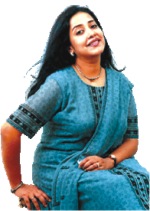 THe
quizzing fever has struck Bangladesh at last. Medhabi, hosted by popular
TV actress Subarna Mostafa and directed by Humaun Faridi is a new
quiz show on NTV.
THe
quizzing fever has struck Bangladesh at last. Medhabi, hosted by popular
TV actress Subarna Mostafa and directed by Humaun Faridi is a new
quiz show on NTV.
Here's
how it works. Four contestants join the quiz contest. The show has
two rounds. In the first round the host introduces the contestants
to the audience. Each of them is asked the same questions and is given
two minutes to answer. While one contestant is answering, the other
three contestants are made to wear sound proof headphones. It is a
test of how many questions you can answer in a couple of minutes.
At
the end of the first round, the quizmaster reveals the score of each
contestant. If anyone ends up badly he is has another chance that
is the second round. The second round is a bit easier, as in this
round, the contestants are given a choice about what topic they prefer
to be quizzed in. There are many subjects such as history, literature,
sports, science, geography etc. to choose from.
In
the second round everybody is asked different questions according
to their favourite topic unlike the first round. In the end of this
round the total score of the two rounds are given and the name of
the winner is announced. All of them are given the same prize! That
is an Oxford Dictionary and a certificate on behalf of Medhabi.
The
overall show is good, however there is enough room to improve. If
we may point a few suggestion maybe the programme will be much more
entertaining like the ones in foreign channels. The quizmaster is
somewhat slow and expressionless, which is a stark contrast to the
vivacious quizmasters like the Bournvita Quiz Contest's Derek O Brian.
Another
problem of this programme is that the contestants are not lively enough
to make it really interesting. Most of the time, their answers are
either wrong or they simply say 'pass'. Sometimes it seems that a
contest of uttering the word 'pass' is going on. And very often they
cannot answer simple questions like how many satellite stations Bangladesh
has. When the contestant perform this way the show turns out to be
quite a lacklustre. In the future Medhabi should be stricter in selecting
final contestant to make the show lively. But anyway it is not at
all bad to watch. It is a shadow programme of BBC's Mastermind quiz
contest. It is aired on NTV every Sunday at 9:50 pm.
